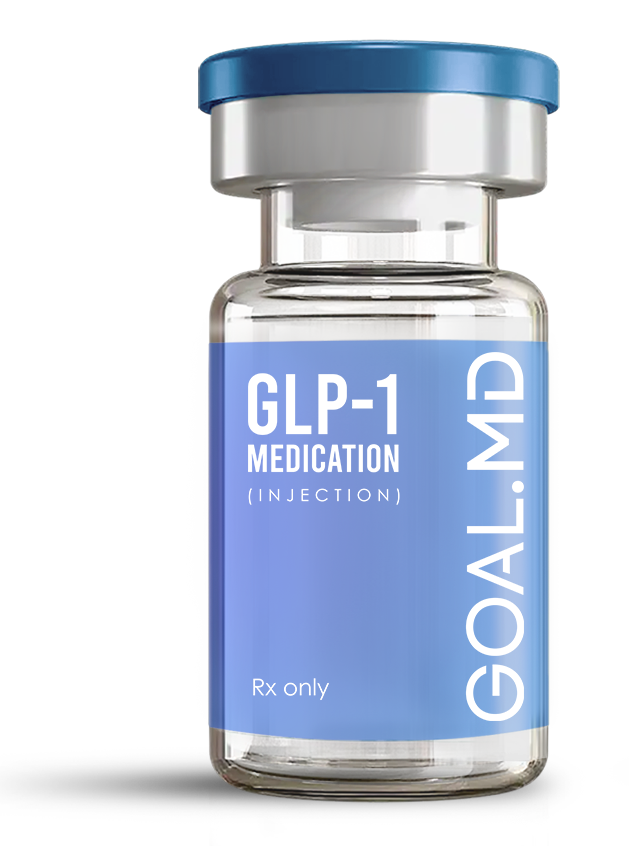
GOAL.MD Health & Wellness Blog
Evidence-based insights, medical weight loss information, and practical tips from our physicians and healthcare experts.

What to Do When You’re Losing Weight—But Don’t Feel Any Different Yet
The Weird Part Nobody Talks About
You’re losing weight.
The scale is going down. Your clothes are fitting looser. Maybe people have even started commenting on it.
But inside?
You still feel… the same.
Same body image.
Same insecurities.
Same “me” staring back in the mirror.
Maybe even less energy, which makes it harder to believe anything is changing.
If that’s where you are right now, you’re not doing anything wrong.
You’re just in a really normal phase of transformation that no one talks about enough.
👉 At Goal.md, patients learn early on that physical progress and emotional progress don’t always happen at the same pace. And that’s okay.

Why You Might Not Feel Different Yet (Even When You Are)
1. Your Brain Hasn’t Updated Your Body Image Yet
You’ve spent years seeing yourself one way.
So even if you’ve lost 10, 20, or 30 pounds, your mental “picture” of yourself doesn’t instantly refresh.
Your brain needs time and evidence to catch up to what your body is already doing.
This isn’t denial.
It’s just human psychology.
2. Weight Loss Shows Up Internally First
GLP-1s often start changing things inside your body long before you feel the difference emotionally.
Things like:
steadier blood sugar
lower inflammation
fewer cravings
calmer hunger signals
less food noise
Those shifts are huge; they’re just quieter.
So even if you don’t feel transformed yet, your body is already doing deep work.
3. You’re Still Adjusting to New Fuel Levels
On semaglutide or tirzepatide, most people naturally eat less, sometimes way less.
So your body is adjusting to:
fewer calories
slower digestion
new hormone signals
a totally different energy rhythm
That adjustment phase can feel like:
low energy
mild brain fog
emotional flatness
“Why don’t I feel excited?”
It’s not forever.
It’s your metabolism recalibrating.
👉 At Goal.md, patients are coached to fuel smartly during this phase so energy returns without slowing progress.
4. Your Identity Doesn’t Shift Overnight
Weight loss changes your body fairly quickly.
But confidence, self-trust, and the way you identify with your body? That grows more slowly.
Feeling different isn’t just about size, it’s about believing the change is real.
And that belief comes with time and repetition.
What to Do Right Now
✅ 1. Track “Non-Scale Wins”
If the scale is moving but your feelings aren’t, look for progress in other places:
clothes fitting better
waistline shrinking
less snacking
more control over food
fewer cravings
better sleep
more stable mood
less joint pain
improved energy (even small improvements count)
Those are real wins. And they matter.
👉 At Goal.md, patients track these weekly, so progress feels visible even when emotions lag.
✅ 2. Take Progress Photos (Even If You Hate Them)
Your mirror adjusts slowly.
Photos don’t.
Take one every 2–4 weeks in the same lighting and outfit.
You’ll see changes your brain has been missing.
✅ 3. Wear Clothes That Fit the Body You Have Now
Not your old body.
Not your future body.
Your body today.
This helps your brain accept your new shape faster.
It’s a simple confidence shift that works.
✅ 4. Add Gentle Movement for Connection
You don’t need intense workouts to feel progress.
Sometimes a walk, stretch, or small strength session helps you feel your body changing again.
Movement reconnects you in a way the scale can’t.
✅ 5. Give Yourself Time to Catch Up
This part matters most:
Feeling different is a stage that comes after enough repetition.
You’re not stuck, you’re adapting.
Progress isn’t only about what you lose.
It’s about what you rebuild along the way.
Final Thoughts
Losing weight without feeling different yet can mess with your head.
But it’s normal.
Your body may be changing faster than your mind knows how to process.
That doesn’t mean the changes aren’t real.
It just means you’re still in the “catch-up” phase.
Keep going gently.
Keep tracking wins that aren’t on the scale.
Keep giving your brain proof.
One day soon, it will click
And you’ll realize you weren’t stuck.
You were becoming.
✅ Medically Reviewed by Dr. Michael Fitch, MD
Last Reviewed: October 24, 2025
This article haD physician protocols. Individual results and recommendations may vary. Always consult a licensed clinician before beginning any medical pros been medically reviewed for accuracy and consistency with current clinical practice guidelines. All treatment descriptions reflect real GOAL.MD gram.

Dr. Michael Fitch, MD
Physician, GOAL.MD – Board-Certified in Internal Medicine
Dr. Fitch has treated thousands of patients using evidence-based medical weight-management therapies including GLP-1 and longevity-focused medications. He leads GOAL.MD’s national physician network and personally oversees treatment protocols for weight loss, metabolic health, and nutrition optimization.
👉 Click here and get started with Goal.md
The GOAL.MD blog is published by GOAL.MD, a medical practice dedicated to personalized, patient-centered weight management and metabolic health. Our mission is to make evidence-based care accessible through licensed providers and modern telemedicine services, empowering individuals to reach their health goals safely and sustainably. Any general health information shared on our blog, website, or social channels is provided for educational and informational purposes only. It should not be considered medical advice, diagnosis, or treatment. The content is not a substitute for consultation with a qualified healthcare professional who can provide individualized recommendations based on your specific medical history and needs. GOAL.MD and its affiliated providers make no representations or warranties and expressly disclaim all liability for any loss, injury, or damage resulting from reliance on the information provided herein. If you have questions about your health or a medical condition, please consult with a licensed medical professional before making changes to your medication, treatment plan, or lifestyle.
Why GOAL.MD?
✅ Sourced from audited 503a US compounding pharmacies.
✅ Custom dosages adjusted to your needs.
✅ Free consultation + 24/7 support.

How It Works
1. Quiz
90 seconds. No commitment.
2. Consult
Video chat with your GOAL.MD doctor.
3. Deliver
Meds at your door tomorrow.
Transform Your Life with Physician-Directed Care
Join thousands who've found success with physician-directed care. Take our 3-minute quiz to see if medical weight loss is right for you.







